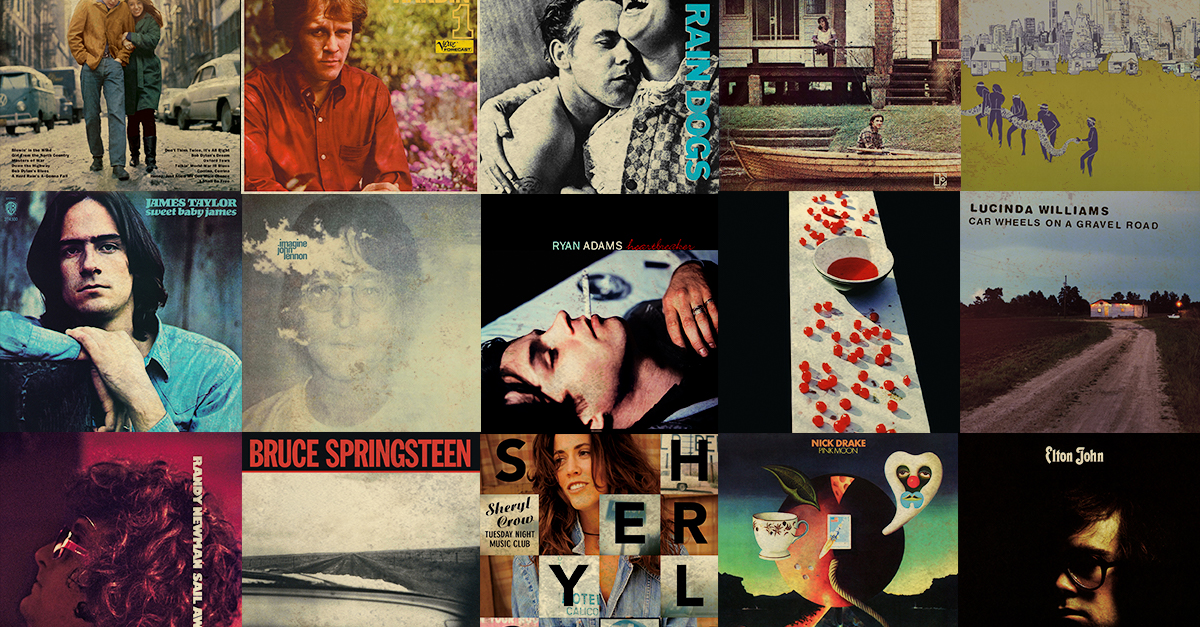The history of singer-songwriters is as rich as music itself. A man or woman singing, accompanied by nothing but a guitar, is inherent to our humanity. It’s a tradition built into the fabric of society. While loud rock bands and thrilling jazz quartets are intoxicating, there are few things as powerful as a singer-songwriter. The combination of lyrics, instrumentation, and melody is a simple formula, but few can solve it like the artists on this list. Granted, this isn’t meant to be a definitive list of the best singer-songwriter albums of all time, this is merely a representation of some of the best examples of artists honoring the tradition of songwriting.
The list covers artists who put a premium on evocative storytelling, little (if any) background instrumentation and beautiful vocals. Of course, beauty is subjective, that’s why someone like Neil Young appears on this list alongside Tracy Chapman. Both have brilliant voices, although completely different in tone, register, and grace. As with everything in this world, the idea of the singer-songwriter has evolved over the years, and that’s why artists like Elizabeth Cotten are joined by musicians like Beck and Sheryl Crow. Above all, these performers prove that there is no singular way to tackle the singer-songwriter model. Each brings a one-of-a-kind style to the subgenre.
This list is a starting point for exploration, not a deep dive into particularly fertile scenes like the British folk movement of the 60s or the outlaw country scene in the 70s. (Both scenes that you should absolutely check out, by the way!) There’s also not much country music here generally because that’s a world in and of itself. (Again, a world most definitely worth exploring!) There are plenty of artists who could, and should be on this list, like Townes Van Zandt, Leonard Cohen, and John Prine. But this is merely a starting point for exploration into the infinite history of singer-songwriters.
Follow our playlist of the best albums from singer-songwriters to hear our picks.
Elizabeth Cotten: Freight Train and Other North Carolina Folk Songs (1958)
While many of Elizabeth Cotten’s songs on Freight Train aren’t originals, the title track more than carries enough weight to qualify her seminal album as an all-time singer-songwriter LP. The blues and folk musician from North Carolina turns in an incredibly moving performance throughout the record, imbuing the traditional folk tunes and original compositions with an unmistakable POV. Plus, Cotten was a lefty playing a right-handed guitar upside down long before Hendrix ever came along.
Selected track: “Freight Train”: Elizabeth Cotten estimated that this song was written in her teenage years, likely in the first decade of the 20th century.
Bob Dylan: The Freewheelin’ Bob Dylan (1963)
Bob Dylan’s second album was a masterpiece of creativity. He wrote only two songs on his debut, but his second contained 12 originals, including “A Hard Rain’s A-Gonna Fall” and “Masters Of War.” The Freewheelin’ Bob Dylan mixed social commentary with love songs, some inspired by the late Suze Rotolo, his teenage girlfriend at the time. She was pictured on the cover too, strolling through Greenwich Village on the arm of the 21-year-old folk singer who was about to inspire a generation.
Selected track: “Blowin’ In The Wind”: Born out of an African-American spiritual called “No More Auction Block,” this song became a folk anthem and instant classic, with Peter, Paul And Mary’s cover version selling 300,000 copies in the first week of release.
Richie Havens: Mixed Bag (1966)
Richie Havens’ was a real musician’s musician. Many of his peers were self-proclaimed fans (Hendrix supposedly had a few of his records), and on Mixed Bag, it’s easy to see why. His elegant blend of folk structures with a loosely-inspired jazz feel made it ahead of its time, while Havens’ rich baritone was at once instantly recognizable and entirely unique.
Selected track: “Handsome Johnny”: This jaunty, anti-war protest song was co-written with actor Louis Gossett Jr.
Tim Hardin: Tim Hardin 1 (1966)
When former marine Tim Hardin died in 1980, aged just 39, there was deep sadness within the music industry at the loss of man described by Joe Strummer as “a lost genius of music.” Tim Hardin 1 contains some of his most frequently covered songs, including “Don’t Make Promises.” It features his rich, soulful voice on a dozen songs that astutely explore despair, drug abuse and a damaged romantic sensibility.
Selected track: “Reason To Believe”: This country-style song was later a hit for Rod Stewart.
Jacques Brel: Ces Gens-Là (1966)
Belgian singer-songwriter and actor Jacques Brel composed wry and tortured songs that had an influence on musicians as diverse as David Bowie (who covered his songs “Amsterdam” and “My Death” live) and Leonard Cohen. Brel died from lung cancer, aged 49, in 1978.
Selected track: “La Chanson De Jacky”: Released as “Jackie,” the song was a UK hit for Peter Straker, whose version was produced by Freddie Mercury.
Laura Nyro: More Than A New Discovery (1967)
Bronx-born Laura Nyro was 19 when she released her debut album and, though it was not a commercial success at the time, it had a huge influence on Joni Mitchell and Rickie Lee Jones. The poetic lyrics and emotional delivery made Nyro one of the most important female singer-songwriters of the 60s and 70s. Nyro also died aged 49, due to complications from ovarian cancer.
Selected track: “Wedding Bell Blues”: A song that spawned a new catchphrase in America.
Neil Young: After the Gold Rush (1970)
Neil Young has many peerless records, but After the Goldrush stands alone. From the haunting piano of the title track to the crunchy rock of “Southern Man,” Gold Rush is a front-to-back triumph. The record is one of four high-profile albums released by each member of Crosby, Stills, Nash & Young, who each explored solo territory after their chart-topping 1970 album Déjà Vu.
Selected track: “Southern Man”: An undeniable classic.
James Taylor: Sweet Baby James (1970)
James Taylor was broke and homeless when he made one of the definitive albums of the 70s. Marrying his sweet voice and deft acoustic guitar playing to memorable lyrics – with some relaxed accompaniment by Carole King on piano – the album launched James onto the world stage as one of the new superstars of the singer-songwriter genre.
Selected track: “Fire And Rain”: An enduring folk classic, this song was also covered beautifully by Bobby Womack.
Cat Stevens: Tea For The Tillerman (1970)
Blending haunting singing, potent lyrics and majestic orchestration, Cat Stevens’ album was a triumph of musical ambition from the artist who later converted to Islam as Yusuf Islam. Tea For The Tillerman is bursting with memorable songs, including “Wild World,” “Hard-Headed Woman,” and “Father And Son.”
Selected track: “Where Do the Children Play?”: A disconcerting song about ecological threats facing the world nearly half a century ago.
Elton John: Elton John (1970)
The first album released by Elton John in America gave the British star his debut US chart hit with the wonderful “Border Song.” Featuring songs written with his long-time writing partner Bernie Taupin, this album established John as a key solo artist of the 70s.
Selected track: “Your Song”: Simply one of the sweetest love songs of all time.
Tim Buckley: Starsailor (1970)
Tim Buckley, father of Jeff, produced a body of work that was enormously varied. On Starsailor, arguably his finest album, Buckley managed to blend folk with avant-garde jazz in an original way, while his maudlin voice floated over beguiling imagery and troubling lyrics, as on “I Woke Up.”
Selected track: “Song To The Siren”: A beautiful and stark love song.
Paul McCartney: McCartney (1970)
The man – and pen – behind some of the greatest pop songs of the 20th century made his debut album during a period of acrimony with his former Beatles colleagues. Paul McCartney played every instrument on the album, including drums and toy xylophone, and was backed by then-wife Linda on vocals. The album went straight to No.1 on the Billboard charts.
Selected track: “Maybe I’m Amazed”: A striking and strident love song.
John Lennon: Imagine (1971)
Imagine contains all sorts of gems beside the title track, including the acidic “How Do You Sleep?” George Harrison plays guitar and Phil Spector produces an album that also contains the powerful protest song “Gimme Some Truth.”
Selected track: “Imagine”: A song that captures the eternal hope of a world built on brotherhood and peace.
Carole King: Tapestry (1971)
Carole King, one of the best modern songwriters, took the brave step of recording some of her own soul classics as slow-burning folk melodies. The result is intimate, with moving versions of “(You Make Me Feel Like) A Natural Woman” and “Will You Still Love Me Tomorrow.”
Selected track: “You’ve Got a Friend”: Also a chart-topper for James Taylor.
Dolly Parton: Coat Of Many Colors (1971)
The extravagant personality and sweet singing of Dolly Parton sometimes obscures her considerable talent as a songwriter. “I’ve always prided myself as a songwriter more than anything else,” the Tennessee star said. The title song of Coat Of Many Colors is one of country music’s most touching songs about childhood.
Selected track: “My Blue Tears”: An outstanding bluegrass track.
Nick Drake: Pink Moon (1972)
Nick Drake’s tragic death in 1974, aged just 26, from an overdose of antidepressants, has meant that the singer-songwriter’s life has come to personify a particular idea of doomed romanticism. The wistful beauty of Pink Moon, a stripped-down acoustic album that allows his fragile words to soar, is full of treats such as “From The Morning.”
Selected Track: “Place To Be”: A haunting song about depression.
David Ackles: American Gothic (1972)
David Ackles was appearing in Vaudeville from the age of four. As a musician, his critical peak came with American Gothic (produced by Bernie Taupin), a sprawling and ambitious album about his homeland. Ackles was also a major influence on Elvis Costello.
Selected track: “Montana Song”: A bold and gritty 10-minute song about the hardships facing the first American settlers.
Randy Newman: Sail Away (1972)
Randy Newman is at his sardonic best on his third album. “Political Science” is a piece of political satire perhaps relevant nearly half a century on, and few songwriters would have the courage to record an anti-slavery song as edgy and ironic as “Sail Away.”
Selected track: “God’s Song (That’s Why I Love Mankind)”: A song in which God chooses to speak through Randy Newman.
Van Morrison: Veedon Fleece (1974)
Though Astral Weeks gets the most kudos, Veedon Fleece, set mostly in Ireland, is Van Morrison’s overlooked masterpiece and a great example of ambition and imagination in songwriting.
Selected track: “You Don’t Pull No Punches, But You Don’t Push the River”: A blissfully enigmatic epic.
Janis Ian: Between the Lines (1975)
Janis Ian’s brilliant 1975 breakthrough LP, Between the Lines, helped bring a folk resurgence to the forefront of mainstream music after the genre dominated the 60s thanks to stars like Bob Dylan and Joan Baez. Between the Lines reached No.1 on the Billboard charts thanks to Ian’s brilliant vocal performance and patient, contemplative arrangements.
Selected track: “At Seventeen”: An anthem for social outcasts everywhere.
Joni Mitchell: The Hissing Of Summer Lawns (1975)
Four years after the seminal Blue, Canadian Joni Mitchell released an experimental, jazzy album that would come to be regarded as a classic, especially by Prince. The Hissing Of Summer Lawns features contributions from James Taylor and includes the song “The Boho Dance,” about a refusal to betray artistic values for commercial gain.
Selected track: “Sweet Bird”: A sparkling Mitchell delight.
Bruce Springsteen: Nebraska (1982)
Nebraska was described by Rosanne Cash as “one of the great documents of American life.” This bleak, solo acoustic album was Springsteen’s attempt to write a non-commercial “inner-directed, psychological” album. It contains some of his finest personal songs, including “My Father’s House” and “Mansion On The Hill.”
Selected track: “Used Cars”: A short, sharp gem about the American Dream.
Tom Waits: Rain Dogs (1985)
By the mid-80s, the now gravelly voiced Tom Waits had come a long way since his gorgeous yet somewhat straightforward 1973 debut album, Closing Time. Rain Dogs is an ingenious and unpredictable album about America’s “dispossessed,” and is full of songwriting treasures such as “Time,” “Downtown Train,” and “Singapore.”
Selected track: “Hang Down Your Head”: One of the most affecting songs Waits has ever written.
Steve Earle: Guitar Town (1986)
Few debut LPs have been as assured as Steve Earle’s Guitar Town. The project introduced the country-folk artist as an instant star, thanks to his gravelly voice, brilliant lyrics, and mesmerizing voice. The record was an instant smash. It topped the Billboard country album charts, and the title song reached No.7 on the country singles charts. Earle was also nominated for two 1987 Grammy Awards, Best Male Country Vocalist and Best Country Song, for the title track.
Selected track: “Guitar Town”: An infectious opening salvo from a new talent.
Paul Simon: Graceland (1986)
Paul Simon had one of the best back catalogues in popular music when he came to make this ambitious album in 1986. Featuring South African musicians, Graceland was a triumph, full of warm and witty songs amid despair.
Selected track: “You Can Call Me Al”: Simon at his deceptively simple best.
Tracy Chapman: Tracy Chapman (1988)
Tracy Chapman’s self-titled debut is one of the most iconic first albums in history. It featured a smash hit in “Fast Car,” but the record’s true strength is in its depth and precise scope. Chapman dives into folk traditions through a contemporary lens, offering a vital perspective as a Black woman in folk music. It’s no wonder Elektra Records signed her as soon as she showed them a demo of her single, “Talkin’ ‘bout a Revolution.”
Selected track: “Fast Car”: One of the most indelible 80s songs.
Sheryl Crow: Tuesday Night Music Club (1993)
Tuesday Night Music Club is classy upbeat country-rock from Sheryl Crow, a former music teacher from Missouri. The album title was taken from the studio group who composed and recorded the album, with guitarist Bill Bottrell acting as producer.
Selected track: “All I Wanna Do”: The song that launched Crow was based on the poem “Fun” by Wyn Cooper.
Elliott Smith: Either / Or (1997)
Elliott Smith’s Either / Or has set the modern standard by which all other singer-songwriter albums are measured. Elliott’s unimpeachable masterpiece introduced the reclusive songwriter to a wide audience, especially after Gus Van Sant included three songs from Either / Or in the Good Will Hunting soundtrack. “Miss Misery” was nominated for Best Original Song at the 1998 Academy Awards, and was performed at the televised ceremony in an abridged version by Smith.
Selected track: “Between the Bars”: Melancholy perfected.
Lucinda Williams: Car Wheels On A Gravel Road (1998)
Country singer-songwriter Lucinda Williams’ fifth studio album was a painstaking one, taking six years to make after having been recorded twice from scratch. The emotive songs were a hit and it was her first album to go gold.
Selected track: “Jackson”: A gritty tearjerker.
Sufjan Stevens: Seven Swans (2004)
Picking a great album from Sufjan Stevens’ eclectic discography is a tough choice, but on a pure level of songwriting composition, Seven Swans stands the test of time. The record, released in 2004, effortlessly transforms stories of Christ, Abraham, and Christianity into applicable everyday stories. As always, Stevens takes universal maxims and indisputable truths and scrutinizes them with the perspective of a believing skeptic.
Selected track: “To Be Alone With You”: Hushed brilliance.
Beck: Morning Phase (2014)
The Grammy Album Of The Year for 2015 was the first album Beck had released for six years following health problems and is full of sweetly melancholic songs. Beck said that the impressive songs on Morning Phase felt “personal, direct, and uninhibited.”
Selected track: “Wave”: An eerie and meditative treat.
David Crosby: Lighthouse (2016)
David Crosby’s affection for jazz tones was clear on his 1971 classic If I Could Only Remember My Name and his album from 2016, co-written with Michael League of jazz-funk band Snarky Puppy, was his finest in nearly five decades. The songs were performed with real feeling by the 74-year-old songwriter.
Selected track: “Look In Their Eyes”: A tender plea for compassion for refugees.
Follow our playlist of the best albums from singer-songwriters to hear our picks.



